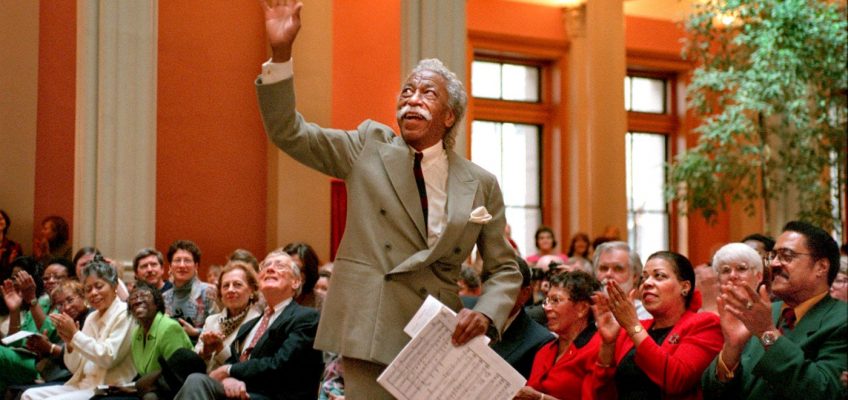Nearly 20 years after his death, photographer, filmmaker, author and activist Gordon Parks continues to inspire others and now legislative funding will help make plans to honor him a reality.
With his “American Gothic” looking over his shoulder, photographer Gordon Parks gestures while speaking at the Corcoran Gallery in Washington Tuesday Sept. 9, 1997 during the opening of an exhibit of his works. (AP Photo/Susan Walsh)
Rep. Samakab Hussein, DFL-St. Paul, and Sen. Foung Hawj, DFL-St. Paul, on Sunday will announce legislative appropriations to commemorate Parks who began his photography career in St. Paul. Funds are allocated through the legacy finance bill authored by Husssein and Hawj and approved by Gov. Tim Walz in May.
“We’re really excited that the state of Minnesota is honoring and finally saying that the legacy of Gordon Parks is so important to the state,” said Parks’ grandniece Robin Hickman-Winfield. “Honoring and celebrating his life and legacy is important to the state of Minnesota.”
Hickman-Winfield said it’s been a long journey to getting the resources for a memorial for her uncle.
While plans for the memorial are still in development, Hickman-Winfield, Landmark Center Executive Director Amy Mino and others have discussed possibly having a statue of Parks in the Landmark Plaza.
They have wanted the memorial to be surrounded by “the footsteps of Uncle Gordon,” Hickman-Winfield said. That includes sites such as The St. Paul Hotel where he worked as a waiter and the Frank Murphy women’s clothing store in The Lowry Building that hired a young Parks to take some of the photos that helped start his career.
Parks would return to St. Paul in the 1990s to perform with a symphony orchestra at Landmark Center.
“So, his stomping ground where he worked, where he walked, surrounded Landmark Plaza. So for him to stand there, to take his rightful place (in) downtown St. Paul … .that’s why we selected that place,” Hickman-Winfield said.
Hickman-Winfield, Mino, Kevin Lindsey, chief executive officer of the Minnesota Humanities Center, Parks Legacy Initiative Partnership members and other community members and legislative leaders will attend Sunday’s announcement, which will take place on the birthday of Parks, who was born in 1912.
Hussein serves as the co-vice chair of the House Legacy Finance Committee and Hawj is the chair of the Senate Environment, Climate and Legacy Committee and one of the authors of the appropriations bill.
Hussein said the project will uplift a cultural voice.
“This is a part of the art and cultural funding,” Hussein said. “And we are proud that we are putting his statue and his legacy in downtown St. Paul so kids and families and people from Minnesota can leave with his life’s legacy and what he has done.”
Related Articles
St. Paul exhibit pairs works by Gordon Parks and photographer he inspired
Gordon Parks still inspires at St. Paul school that bears his name
Star of 1969 film ‘The Learning Tree’ dedicates tree at school that bears Gordon Parks’ name
Celebrate Gordon Parks with two of his films, a documentary, remarks by actors who knew him
Parks got his start with photography taking pictures at Frank Murphy’s clothing store. He would go on to shoot fashion for Vogue, capture scenes of poverty for Life and images of segregation for the Farm Security Administration. He also was a composer and the first Black director at a major Hollywood studio.
To view Gordon Park’s photography and learn more about his career go to gordonparksfoundation.org.




